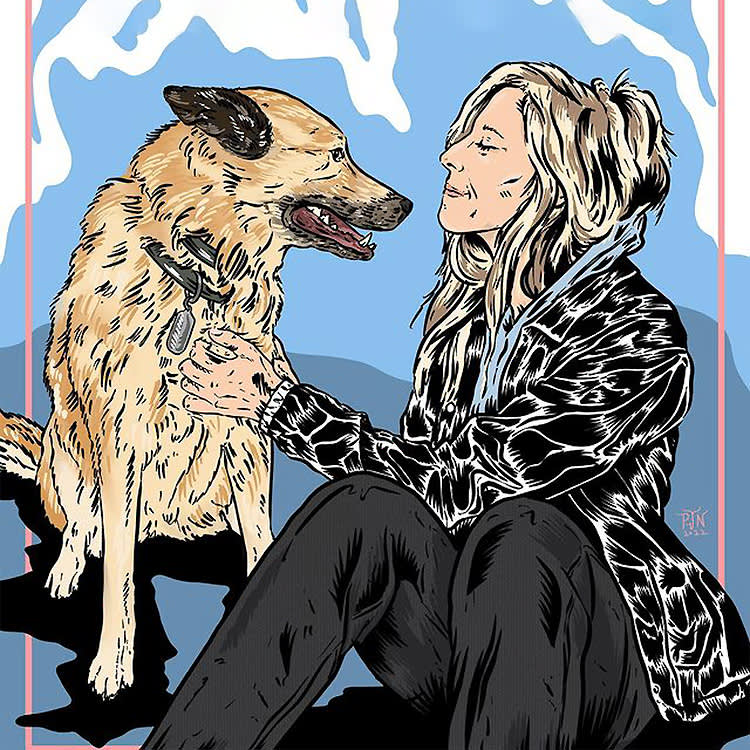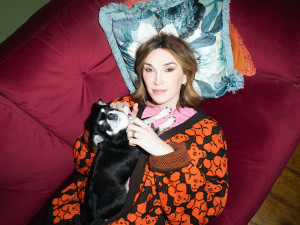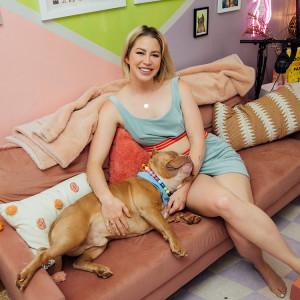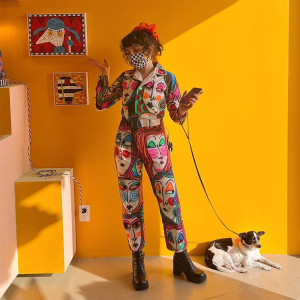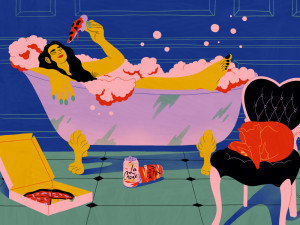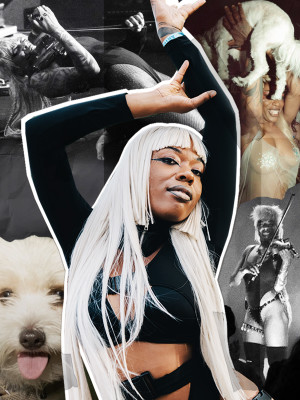Bully’s Latest Album Is a Love Letter to Her Dog
How the Nashville-based artist forever captured the spirit of her best friend and “rock.”
Ever since Alicia Bognanno — aka alt-rock front woman Bullyopens in new tab — was little, she knew she needed a dog. “But there was four of us kids, and we were all kind of close in age. Getting an animal just wasn’t really in the cards. I had waited my whole life for Mezzi,” she tells Kinship of her late rescue, a Husky mix. (She named her after mezzaluna, a type of ravioli, because she was working at an Italian restaurant at the time.)
Her latest album, Lucky for Youopens in new tab, is a love letter to Mezzi, her dog of 13 years, who recently passed away, devastating the Nashville-based musician. “I didn’t know at the time when I was younger, but I have bad emotional things. I’m also neurodivergent and really struggled with school,” she recalls. “When I was around dogs and animals, I felt this unconditional love and acceptance that I wasn’t getting from anywhere else in my life.” The minute Bognanno rented her first apartment in college, she got Mezzi. “We grew up together. The most pivotal moments in my life were with her. Mezzi was the best thing that’s ever happened to me. I learned to love and in a way that I didn’t even know existed.”
Kinship caught up with Bognanno, who’s currently on touropens in new tab, to dig into her emotionally charged album (released June 2) and discuss how she’s still trying to forge ahead after losing her best friend.
Let’s start with Lucky for You and how songs, such as “Days Move Slow” and “A Wonderful Life,” were inspired by Mezzi. I did read that this was the longest time it’s ever taken you to create an album. Is that the reason why?
I had a few things written. We would take breaks, or I would tour. Shortly after Mezzi passed, most of my writing kind of twisted from there because I ended up writing a lot more songs relevant to the way that I was feeling. She was, like, my soulmate. I live alone. It was the two of us. Every time I wrote, she was right by my side. She traveled with me. She toured with me. She was my rock. A year before she passed, she got diagnosed with cancer. Anytime we would go outside, I would just kind of look at her and start tearing up. It was hugely influential to my writing this record. She was my whole world.
How much do you spend on your pet per year?
So, you write “Days Moves Slow” — or at least you start it — and then Mezzi dies. How did you tinker with the song to make it more resonant of where your headspace was?
That was the first thing that I really did after she passed. I spent so much time staring out the window, and I felt like I couldn’t really do anything. Everything felt like such a chore. And I was really avoiding writing, because she’s usually sitting down right next to me. Eventually, I wrote that and “A Wonderful Life” in the same day. It felt like it was like all that I could do. I really didn’t tweak the lyrics for the couple of songs that happened before either, because they still applied. Everything is more or less about this idea of death and permanence.
Is that why it took longer to work on the album?
Oh, no. It was just a different process. I sat down with a producer, [JT Daly], and the two of us played everything and did everything. And we lived close by, so we didn’t have a deadline. We had sat down and started working together a little bit before Mezzi passed, and then everything kind of changed from there. The record was definitely taking a different turn because it was just all about her.
Has it been hard for you to discuss this and put it out into the world?
Yeah, yeah, definitely. Like, I think about that all the time. The most difficult part is having to explain the songs. But I knew that I was gonna have to release it and talk about it. She’s all I talked about before she died.
You’ve been pretty open about your bipolar diagnosis. How did Mezzi help you throughout that journey?
The trial-and-error process for medication is, like, horrible. Yeah, but Mezzi was always there for me. I’m bipolar type II. So that means my mania, to me, feels like I’m euphoric: “I’m so happy! This is the best!”
And then my depression is the worst. I would get to my very, very, very lowest point where I was like, “What is the point? What am I doing here?” I would look at Mezzi and be like, “This is what I’m doing here. I cannot leave Mezzi.” So anytime I was having an episode, I would just hold her, and she would be there for me. One time a tour manager was crashing at my house, and I was working on my computer in the kitchen. He was like, “I don’t think you know this. But while you’re working, you just look at Mezzi and start smiling and go back to work.” She just calmed me down.
Do you still feel her presence ever?
I had this experience a few months ago, where I was by the ocean and looking off a dock, and a manatee swam right up to me. It just looked at me, dead in the eyes. My immediate thought was, “That was Mezzi. For sure that was Mezzi.”
So, Lucky for You is obviously driven a lot by grief. But how would you explain the theme of the album, as a cohesive piece of work?
Just this overall feeling of accepting impermanence — grappling with that and the idea that so many things are completely out of our control. Everything is going to change at some point. I spend a lot of time thinking about that, because it’s kind of a hard pill to swallow. But I think it’s really important to consider, because it is reality.
Do you reconcile any of that? How does it end after you finish the album? What is the conclusion?
It’s still unsettling. I think I’m constantly figuring it out and working on it. But it’s very important to write about something that is personal and that means a lot to me because I know I’m gonna have to play it live every night for years. It’s like an hour-long therapy session. There is a lot of peace that comes with that.
So you actually have another dog, Papa.
I was fostering him when I had Mezzi, when COVID happened. I ended up adopting him, because they got along so well. They’re very different. He’s like, “I don’t care about you. I want to be under your blanket all day.”
How often do you foster?
Well, I travel a lot. So I’m basically fostering when I can be here, at least for two weeks. After Mezzi passed, I kind of started fostering again. Honestly, I really needed big comfort dog energy. But also, I’m not ready for another dog. Every time I think I might be, I realize it’s too scary for me to commit. I’m still grieving Mezzi, and I have this weird fear that if I commit to another dog, I’ll forget about her or something. I don’t know. I think it’s just like a weird part of grieving. I thought Papa would maybe love it, too. But Papa doesn’t give a shit. It was like, “I want to be left alone at all times. Like, I want to take your bed, and I want to try whatever treats that are gonna come. And then just leave me alone.”
Is he there when you record?
He’ll be like, “Huh?” But yeah, he’s not very interested in anything. If anything, he’ll leave the room. I don’t think he’s a Bully fan.
